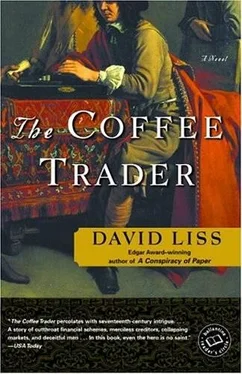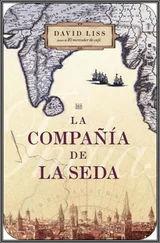Daniel smiled thinly. “We’ll see,” he said.
The next morning Miguel swallowed the bitter medicine of transferring the funds to his brother. He nearly choked as he gave the order to the clerk at the Exchange Bank, but it had to be done.
As he went about his business that day, he tried hard not to recollect that of the three thousand guilders Geertruid had entrusted to him, little more than a thousand remained.
from
The Factual and Revealing Memoirs of Alonzo Alferonda
I believe I may have mentioned that Miguel Lienzo was some years my senior and I did not know him well when I was a boy. I knew his brother, however, and if I had not heard from my father that Miguel was a superior and wily boy, I would have had no interest in knowing more of the family.
Daniel Lienzo was a child who knew his assets and shortcomings from an early age. He had not nearly the physical strength of the other boys we played with, but he was much faster. Understanding how to manage his gifts, he would have nothing to do with games of wrestling but insisted we race all day. He only wanted to play at sport in which he could win.
Though he was known to be his father’s favorite, he complained bitterly about his older brother, unable to accept the unfairness that Miguel should be older, larger, and farther along in the world. “My brother wastes his time studying Jewish books,” he would tell us in conspiratorial whispers, as if the rest of us were not secreted away by our fathers and taught forbidden things by candlelight. “My brother thinks himself a man already,” Daniel complained. “He is always after the serving girls.”
Daniel would have studied Torah if only to prove himself his brother’s master. He would have chased girls though he knew not what to do with them, if only to prove he could catch where his brother could not. The idea was absurd. Miguel had a quicker mind than Daniel, and his appearance was far more pleasing to the ladies. Still, Daniel could never forgive the slight of being born second.
I can recall that when I was but twelve years of age, only a few months before we fled Lisbon, Daniel came to us and said he had a trick he wanted to play. His older brother had spirited a kitchen girl away into a quiet closet in their house, and he thought it would be amusing to expose them.
Of course it was a foolish thing to do, but we were children and doing foolish things had a great deal of appeal. We followed Daniel into his father’s house and then up three flights of stairs until we stopped outside an old door that sat crooked on its hinges. Daniel signaled for us to be quiet and then threw open the door.
There we saw Miguel sitting on a cushion with a serving girl no more than his own age. Her dress was in a state of disrepair, and it was clear she had been behaving as no good girl ought. The two of them reacted to our presence with utter confusion, and in truth we reacted in utter confusion too. The girl attempted to lower her skirts and close her bodice in a single gesture and, frustrated at her efforts, broke into tears. She called upon the Virgin’s mercy. She was undone.
Miguel reddened, not from embarrassment but indignation. “Leave us!” he hissed. “You may tease a man, but only a coward teases a young woman.” Before, we had been only eager and curious and full of childish giggles over we knew not what. Now we were shamed, by our curiosity and his hard glare. We’d committed a crime we were too young to understand, and our lack of understanding made it all the more terrible.
We all backed up and raced down the stairs, but I paused because I saw that Daniel did not move. He stood in the doorway, preventing Miguel from closing it. I could not see his eyes, but I somehow knew he stared hard. At Miguel? The girl? I don’t know, but he was utterly unmoved by Miguel’s majestic wrath or the girl’s tears.
“Go!” Miguel told him. “Can’t you see the girl is distressed?”
But Daniel stood there staring, listening to the girl’s muted sobbing. He never moved for as long as I dared to remain.
For what reason do I mention this? my reader may wonder. Well, it is to help explain some of the animosity between these two men, which went back many years and was, as near as I could tell, utterly senseless.
But such was the way with these brothers. Thus the reader may not be entirely surprised to learn that it was Daniel Lienzo himself who owed Miguel more than two thousand guilders in whale-oil debt. Far from being in debt to his brother, Miguel was his creditor and never once suspected it.
The letters had been coming in at the rate of two or three a week, and Miguel stayed up late, straining his eyes against the thin light of a single oil lamp, to answer them. Animated by coffee and the thrill of impending wealth, he worked with jubilant determination, making sure his agents understood precisely what he required of them.
Miguel had not seen Geertruid since his return from Rotterdam, which made it easy to avoid dwelling on having lost most of her capital. He knew of men who had lost their partners’ money, and they invariably broke down in confession immediately, as though the burden of living in falseness was too much to endure. Miguel felt he could live with the falseness as long as the world let him get away with it.
Nevertheless, he wanted to see Geertruid and tell her of his progress, and he had other things to say too, but Geertruid was nowhere to be found. It was a cursed time for her to hide herself. Miguel sent messages to all the most likely taverns and paid visits to those places at even the most unlikely hours, but he found no sign of her.
Once, by coincidence, he ran into Hendrick, who stood idly near the Damrak. He leaned against a wall and busied himself with his pipe, watching as men and women paraded past him.
“Ho, Jew Man,” he called out. He puffed smoke cordially in Miguel’s direction.
Miguel hesitated a moment, wondering if he could pretend to have neither seen nor heard Hendrick, but it was no good. “What news of Madam Damhuis?” he asked.
“What?” Hendrick asked. “You don’t ask after my health? You injure me.”
“I am sorry for the injury,” Miguel said. He had, over time, learned to defuse Hendrick’s bombast by pretending to take it seriously.
“As long as you’re sorry, that’s the important thing. But it’s Madam Damhuis you want, and I can’t hope to serve as Madam Damhuis serves. I haven’t her charms.”
Was he jealous? “Do you know where I might find her?”
“I haven’t seen her.” Hendrick turned his head and blew a long cloud of smoke.
“Perhaps at her home,” Miguel began hopefully.
“Oh, no. Not at her home.”
“Still, I should not mind looking for myself,” Miguel pressed, wishing he could be more clever and subtle. “Where might I find her home?”
“It’s not for me to say,” Hendrick explained. “You foreigners are perhaps not so clear about our customs. If Madam Damhuis has not told you, it would not be my place to do so.”
“Thank you, then,” Miguel said as he hurried off, eager to waste no more time.
“If I see her,” Hendrick called after him, “I’ll be sure to give her your regards.”
Such was his luck that day. He decided, on a whim, to visit the coffee tavern in the Plantage, but when the Turk Mustafa opened the door-only a crack-he stared suspiciously at Miguel.
“I’m Senhor Lienzo,” he said. “I’ve been here before.”
“This is not the time for you,” the Turk said.
“I don’t understand. I thought this was a public tavern.”
“Go away,” the Turk said, and closed the door hard.
Hannah sat in the dining room, eating her breakfast of white-flour bread with good butter and some yellow apples that an old woman had been peddling door-to-door the previous evening. Her wine was more heavily spiced and not nearly so watered down as usual. Annetje knew how to be parsimonious with the wine and generous with the water-more wine for herself that way-so Hannah understood what the strength of her drink meant. The maid wanted to talk with her and so tried to loosen her tongue.
Читать дальше












